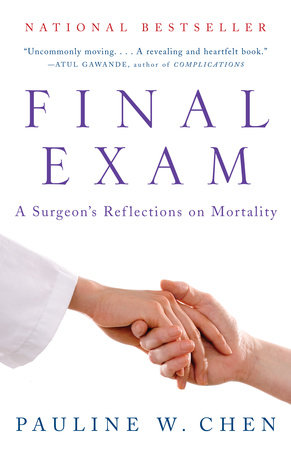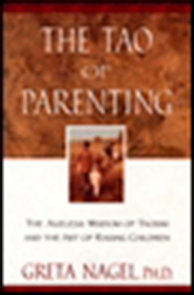READERS GUIDE
“Uncommonly moving. . . . Revealing and heartfelt. . . . Pauline Chen takes us wherefew do—inside the feeling of practicing surgery, with its doubts, failures, and triumphs.”
—Atul Gawande, author of Complications: A Surgeon’s Notes on an Imperfect Science
The introduction, discussion questions, and suggestions for further reading that follow are designed to stimulate your group’s discussion of Final Exam, Pauline Chen’s searing memoir about her medical education and its failure to prepare doctors to deal with one of their most disturbing—and frequent—experiences: the death of a patient.
Introduction
In Final Exam, Pauline Chen tells the story of her own medical education and the many crucial experiences with patients that led her to become a more empathic, more compassionate, and more patient-oriented doctor.“I never intended,” Chen writes, “to make my living among the dying.” She began her medical career with dreams of saving lives but found very quickly that death would be a constant, though largely unacknowledged, companion. Chen reveals the many ways doctors are taught to distance themselves from their emotions. Dissecting a cadaver to learn human anatomy is the first experience designed to help doctors feel that the “dead human body [is not] ‘one of us’ but ‘one of them,’ a medical case to be understood but not embraced” [p. 8]. This demand to understand but not embrace, Chen finds, runs throughout the medical profession and is reinforced again and again. Why? Because doctors, even more than most of us, fear death and feel they must prevent, control, deny, and emerge victorious over it in every circumstance, no matter how dire. The body has become, for them, a “potentially reparable biological machine.” Chen shows that doctors are given little or no training in how to deal with death, how to talk to terminally ill patients and their families, or how to offer comfort when all the technologies and surgical procedures fail.
But Chen’s narrative is as much about her own journey to a more humane and compassionate approach to terminal illness as it is about a dysfunctional educational system. She writes with arresting immediacy of desperate attempts to keep patients alive, of the tortured death of an infant after many futile surgeries, of a dying friend she could not call, of an organ-donor corpse whose body bore an unnerving resemblance to her own. Chen brings a remarkable degree of self-awareness and sensitivity to these experiences, and by examining them so closely, she begins to see what she lacks as a doctor and what she must do to become someone who can comfort as well as heal.
As gripping as the best fiction, Final Exam offers deeply important insights not only into our medical system but into the human condition itself.
Questions and Topics for Discussion
1. What ideals and expectations does Pauline Chen begin her medical career with? How does the reality of life as a doctor challenge these ideals?
2. Final Exam is about Pauline Chen’s education by two very different sets of teachers: doctors and patients. What does she learn from doctors? What does she learn from patients? In what ways are these lessons incompatible? Which education proves to be most important?
3. In what ways does Chen change during the time period covered in Final Exam? How is she different by the end of the book? What experiences have been most crucial bringing about these changes?
4. What are the major problems with the medical establishment as revealed by Final Exam?
5. Chen writes that doctors “learn not only to avoid but also to define death as the result of errors, imperfect technique, and poor judgment. Death is no longer a natural event but a ritual gone awry” [p. 95]. What are the consequences, for patients and for doctors, of this way of defining death? What would be a more realistic and helpful definition?
6. Chen writes of dissecting a cadaver as a kind of initiation and says that “to complete the initiation rite successfully . . . we need to learn to separate our emotional self from our scientific self; we must view this dead human body not as ‘one of us’ but as ‘one of them,’ a medical case to be understood but not embraced” [p. 8]. Why is traditional medical training so concerned with repressing, ignoring, or denying such natural human emotions as empathy, compassion, fear, and love? What supposed advantages is this suppression of emotion thought to confer upon the doctor? What is inherently problematic with such a view?
7. Why do doctors, in Chen’s view, feel the “need to be infallible in a highly variable world” [p. 119]? What are the consequences of such a need?
8. Chen draws upon her experiences with real patients. What do these people add to the story she tells in Final Exam? Which of these cases is the most moving? How do the patients Chen writes about change her?
9. Chen writes that doctors grow to feel immortal because they survive while so many patients do not. By the time Chen has operated on more than sixty organ donors, she feels her own immortality “was beyond question” [p. 197]. Then she must operate on a woman whose body bears an uncanny resemblance to her own. How does this affect her?
10. When Chen begins writing stories about her experiences as a doctor, she tells “the truth, painfully uncovering each fictional persona and finding the memory within” [p. 202]. What does writing stories reveal to Chen? Why would writing about her experiences, rather than simply reflecting on them, lead her to a revelation about herself?
11. What makes Chen’s writing so compelling? In what ways does Final Exam read more like a novel than a book of nonfiction?
12. What promising signs does Chen see in the ways doctors are learning to treat the terminally ill? What remains to be done?
13. Which doctors in Final Exam does Chen most admire? How do their words and deeds affect her?
14. At the very end of Final Exam, Chen writes, “I had comforted my patient and his family. I had eased their suffering. I had been present for them during life and despite death. I had caught a glimpse of the doctor I could become” [p. 211]. What essential truth does Chen embrace here? What kind of doctor is she likely to become?



















